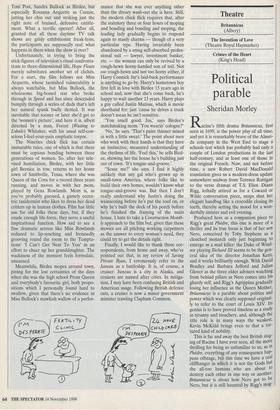Theatre
Britannicus (Albery)
The Invention of Love (Theatre Royal Haymarket)
Crimes of the Heart (King's Head)
Political parable
Sheridan Morley
Racine's fifth drama Britannicus, first seen in 1699, is the power play of all time, and yet it is remarkably brave of the Almei- da company in the West End to stage a schools text which has probably had only a couple of London productions in the last half-century, and at least one of those in the original French. Now, and not before time, a new Robert David MacDonald translation gives us a modern-dress update somewhere midway from Terence Rattigan to the verse dramas of T.S. Eliot. Diana Rigg, lethally attired as for a Coward or Wilde conversation piece, snaps shut her elegant handbag like a crocodile closing its teeth, thereby setting the mood for a won- derfully sinister and evil evening.
Produced here as a companion piece to Rigg's great Phedre, this one is more of a thriller and its true focus is that of her son Nero, conceived by Toby Stephens as a clenched monarch only just beginning to emerge as a mad killer: the Duke of Wind- sor playing Richard III seems to be the gen- eral idea of the director Jonathan Kent, and it works brilliantly enough. With David Bradley and Barbara Jefford and Julian Glover as the three elder advisers watching from behind pillars as Nero comes into his ghastly self, and Rigg's Agrippina gradually losing her influence as the Queen Mother, Britannicus is a parable about politics and power which was clearly supposed original- ly to refer to the court of Louis XIV. Its genius is to have proved timeless as a study in tyranny and treachery, and, although the title role is in many ways the weakest, Kevin McKidd brings even to that a tor- tured kind of nobility.
This is far and away the best British stag- ing of Racine I have ever seen, all the more thrilling for being so unfamiliar to us; as in Phedre, everything of any consequence hap- pens offstage, brit this time we have a real cliffhanger in which it is not the Gods but the all-too humans who are about to destroy each other in one way or another. Britannicus is about how Nero got to be Nero, but it is still haunted by Rigg's mag- nificent old matriarch in a chic, jet-black Production of which she is both star and symbol.
Something seems to have gone very faintly adrift with the transfer, after a year at the National, of Tom Stoppard's The Invention of Love to the Theatre Royal Haymarket. This is still in my view one of his three greatest plays and, like the other two, Rosencrantz and Guildenstem are Dead and Travesties, it also deals with a central character who has somehow missed out on all the really important relationships and opportunities of his life. In this case it is the Shropshire Lad himself, the poet A.E. Housman, and we owe it as always to Stop- pard's quirky research to discover that there were few places the writer hated more that the county which made him immortal.
The play is not only about Housman but all the other writers and dons who invaded his reclusive life, from Oscar Wilde and Frank Harris and Jerome K. Jerome to Walter Pater and John Ruskin, and Sir Tom's genius (here as in Travesties) has been to assemble them all on stage before they discover quite who they are supposed to be. The location this time is the River Thames at Oxford late in the last century, except that nothing in Stoppard is ever quite that simple; this Thames is also the Styx and the Isis, and we are at the end of Housman's life (John Wood in the perfor- mance of his career) as well as in at the start of it.
As the little known, self-torturing, closet- ed gay poet trying to come to some sort of sexual awakening and failing dismally, Wood is simply stupendous, but his perfor- mance has broadened dangerously over the Year, and he no longer has around him the original strength of a great National cast of character actors. Only two or three remain, so that we lose Paul Rhys as Housman's Younger self CI am not as young as I was, Whereas you of course are') and Michael Fitzgerald as Oscar Wilde, just two of the performances which are infinitely weaker in Richard Eyre's new cast. As a result, this becomes more of a solo show with occa- sional celebrity interruptions, and the gen- eral texture of the piece has somewhat coarsened; yet it remains a heartbreakingly Intelligent reminder that Stoppard is often at his best when bringing back to life the Men that literary history has somehow mis- laid. 'I brought creme brulde to Cam- bridge,' notes Housman sadly, tut if that isn't enough I suppose I could start to talk to people' — and biography doesn't come much better than that. 'Oscar Wilde?' recalls an undergraduate contemporary. Never quite the full shilling. You don't catch Tennyson flouncing about Piccadilly with a lily.' Despite winning its author Beth Henley a Pulitzer Prize 20 years ago, having been in constant American revival since and a Much-loved Hollywood movie, I have never been entirely convinced of the greatness of Crimes of the Heart. We are deep in Missis- sippi sometime in the late Sixties, and the play is about three sisters roughly halfway from Chekhov to Louisa May Alcott. Like another unfathomable Broadway hit, Mem- ber of the Wedding, this is a family reunion in crisis; one sister, Lenny (Fiona Molli- son), is the unhappy, near-retarded home- body who has allowed life to pass her by; another, Meg (Helena Little), is home from Hollywood and a disastrous career as a singer, while the third, Babe (Gabrielle Glaister), is a flake who has just pumped several bullets into her recalcitrant hus- band, a local state senator who is under- standably less than delighted.
And that, give or take a couple of minor menfolk, is more or less it in a languid evening which veers from all-out farce to home-baked philosophy; a trio of sisters who have only narrowly escaped the trailer parks are thrown back together and up against the gap between their dreams and what has in fact befallen them at home and away.
Beth Henley is strong on subtle character development and dysfunctional relation- ships, but rather less good on a storyline which lurches around from the comic to the tragic, the touching to the terrible, without ever finding its true direction.
For all that, David Gilmore's new pro- duction is subtle and strong and superbly cast, and betrays an enthusiasm for the play which I only wish I could share; it is arguable that without Crimes of the Heart we would never have had Sisters Rosensweig or Steel Magnolias, but that is not necessari- ly a defence.



















































































 Previous page
Previous page